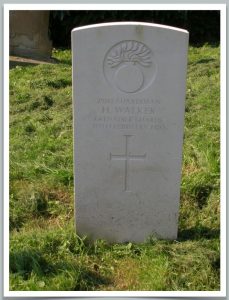5th Battalion, Grenadier Guards

Very little information documentary information has survived relating to Guardsman Walker’s military service but it has been possible to put together a broad outline of it, from what is available.
Harry Walker was born in Dumbleton, Gloucestershire in early 1880.
He was the son of John Walker (1833-1910), and his wife Elizabeth (née Ingles; 1848-1919) and they had twelve children overall born between 1872 and 1896.
The family lived in Dumbleton certainly until the years after the Great War.
John Walker was a farm labourer who turned to market gardening in his later years: he died in 1910 and the 1911 Census shows Henry living with his mother, two brothers and a sister.
His occupation is shown as a ‘carrier’, running a business from home.
Unfortunately no Army Service Record or Pension Record appears to have survived for Henry so there is very little detailed information is available on his military service; however, some clues exist.
His Army service number, 29212, falls within a range of those issued to the Guards around February 1897.
He has an entry in the Guards Medal Roll which states that he served with the 2nd Battalion of the Grenadier Guards and qualified for the Victory and British War Medal, so would have seen service abroad from 1916 onwards.
It is possible that he did attest for military service in late 1915, under Lord Derby’s Scheme but was not mobilised until early 1917.
The CWGC Register shows him with the 5th Battalion: this was a UK based reserve battalion and he would have been added to its strength after being wounded.
A recently released set of Pension Record Cards does contain some useful information.
He was discharged from the Army on 27 March 1919, after suffering a gunshot wound to his left shoulder. Given that he would have undergone a lengthy course of treatment, it seems probable that the wound was sustained during the final months of the war, during the 100 days of the ‘Advance to Victory’.
However in the absence of casualty records this cannot be verified. His mother died in 1919 and one of the cards notes his next of kin to be his sister Edith who was living at The Old Rectory in Dumbleton.
One of the cards states that Harry’s death on 20 February 1920 at the age of 40 was the result of tuberculosis and he appears to have died at home.
Guardsman Harry Walker was buried on 24 February 1920 in the churchyard of St Peter’s, Dumbleton, where a standard CWGC headstone marks his grave.
He is not named on the village war memorial.
Research by Graham Adams 20 September 2020
